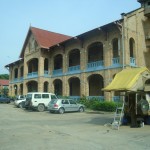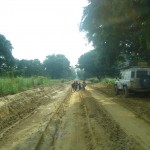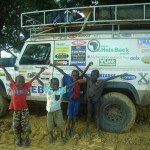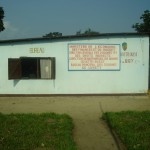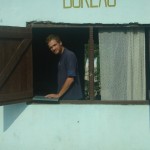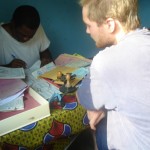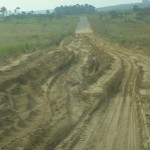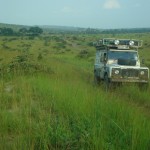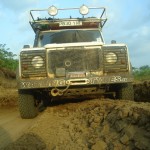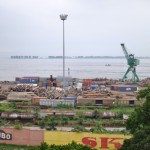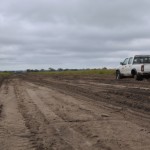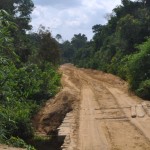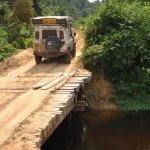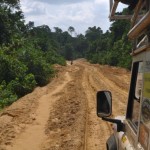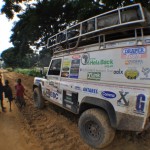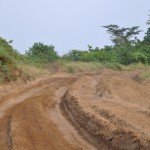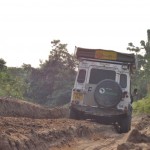Chaos:
1. A condition or place of great disorder or confusion.
2. A disorderly mass; a jumble
Before we knew it, our ‘couple of days in Kinshasa’ had turned into 6, as the Congo-Brazzaville visas and new passport applications had taken longer than expected.
In the meantime, we toured Kinshasa to amuse ourselves. With so much spoken about it due to it’s violent, bloody past and general hassle we certainly approached it with some caution. Luckily we didn’t have a bad experience, but it certainly isn’t the sort of place where you would walk to the shop if you are short on patience or have a headache, someone will always come up to you, someone will always nearly run you over! Over 9 million people crammed into a city built for 500,000, it doesn’t give you much space for yourself, that’s for sure.
The city itself is short on tourist sites and ‘to-do’ lists, but big on atmosphere and culture. When we were young, our parents used to take us to museums and galleries to be force fed ‘culture’. Thus for years, ‘culture’ was distinctly avoided, but Africa shows the fun culture, the monkeys for sale in the street, the amazing colourful clothing and the food, in particular the street food.
For example, being the modern 21st century gent that he is, Tom decided to stop a passing seller and sample the goods, so to speak (we are talking strictly food here). Unfortunately this left him a choice of sun dried caterpillars or dried blow-flies. In fairness, both were swallowed, unlike Carl’s failed attempt to chew through the caterpillar. Taste? A uneasy conflict between rubber tyres and old dust.
Far safer, we figured, were the street kebabs, so gorged ourselves on these $1 beauties for the next couple of days, until our friendly acquaintance Ignace from St Annes explained that last year there had been uproar as human meat had been used to make lots of the street kebabs! He insisted we were safe though, as the human meat had been bought cheaply from the hospital, and we were at least 5 miles from it!
Whilst the dusty high street was frenetic with street sellers, taxis, and pedestrians all jostling for position, there were quieter areas. Like all cities, if you escape to the diplomatic quarter, where the embassy mansions are based and you’ll soon find yourself in almost rural serenity of mowed lawns and long driveways, though the patrolling soldiers here quickly remind you that you are most definitely in a city and most definitely in Africa.
Back at St Anne’s Cathedral we chatted with the other residents, a very friendly and interesting bunch. There was Ignace, a Belgian-Congolese man working for the EU in Kinshasa and off to Indonesia for Xmas with his wife, a German Philharmonic Orchestra over for a week to instruct a Congolese orchestra, Tom and Debra the friendly Canadian NGO film-makers and several adopting Americans.
The Americans were a nice bunch, many of whom had given up huge amounts of time and money to get out to Congo to organise adoption of children from local orphanages. Whilst this is a semi-regular occurrence, unfortunately this time the Congolese officials had decided not to be so helpful and weren’t processing the paperwork, leaving the guys in limbo whilst retaining their passports.
After changing flights 3 times (not refunded!), waiting at the ministry for days on end and paying a few bribes, some of the American party had their paperwork and said goodbyes, but unfortunately as we left a couple still remained. Best wishes guys, we hope it all worked out and that you got home for Christmas.
In order to cross the mighty Congo river and continue on our journey, we needed to take the local ferry from Kinshasa to Brazzaville, which runs 6 days a week. This would be the 4th boat we had put our car on during this trip, out of an expected six.
We left for the harbour on the Saturday, Carl having gone down on the Friday to get as much info as possible. As expected, a sea of touts, agents and fixers descended, before we had even got through the main gate. The police demanded 1000FC ($1) to get the car into the port – utter nonsense but would have taken too long to argue this one!
One of us stuck with the car, the other setting about going through the usual border processes. ‘Give me $100 for all formality’, the official said to us. When we asked what this was for, he explained it was for all immigration and customs. Aah, those two procedures which we have only had to deal with having a trifling 26 border crossings under our bureaucratic belts….
Confirming which buildings were which, Tom brushed past the man and returned 10 minutes later with everything stamped and sorted. Does that mean that the official now owes us $100?
Meanwhile Carl set about ascertaining that the price of the ticket was in fact $150, not $300. Tom returned with the Customs chap who insisted that he must now hold ‘all paperwork’ until we were aboard. Unfortunately being Chief of the Port he didn’t take too well to being told ‘No’. Despite working up to a tantrum, we managed to get him laughing by complimenting him on his outrageously bad Hawaiian shirt.
Eventually ticket buying time arrived . As we prepared to finalise all formalities, we were told that we wouldn’t be able to put the car on the ferry that day. So, having waited for 4 hours, having stamped ourselves and the car officially out of DRC, then to realise we couldn’t leave until Monday, as no ferries run on Sunday. Thanks guys!
We decided to remain illegals, partly to save having to get all our documents out again with big chief still running around and so headed straight back to St Annes Cathedral for some beers whilst we waited for Monday.
On Monday morning we arrived bright and early and breezed through all the various stages, securing new exit stamps on the visas, now familiar with who we had tell to bugger off and who to smile uncontrollably at. After hours of waiting, at 11am the ferry arrived.
The ferry actually consists of 3 small tug boats roped together, which sit very low in the water and plod their way across the fast flowing murky brown expanse of the Congo river.
As the boat became visible, so did more and more Police, many holding large batons or whips fashioned from rope or cord lashed together with strong tape, whilst others went for the most dangerous of all African weapons, the whistle (the rubber stamp is a close second). There were red, black and pink pea-vibrating versions on display, the operators switching between different whistle instructions of beep beep beep, to beeeeeeeeeeeeeeeeeeeeeeeeeeeeep or beeeeep beeeeep beeeeeep. Of course, no one paid a blind bit of notice.
Before the boat had actually docked people were throwing their belongings ashore and jumping from the boat, reminding us of the fascinating tendency for everyone to stand up as soon as a plane stops moving at the airport, even though it will be 20 minuites before anyone can get off! This was something different though.
As the boat docked and a sea of people started to jog up the 3 metre wide walkway, so a similar sized number pushed past them to get to the boat. These were not impatient passengers, but loaders, guys who help move the mind boggling amount of produce that goes back and forth on these boats each day.
These guys just wanted to get their stuff and get it away so pushed past anyone to do just that. The police however, just wanted people moving faster so started whipping people randomly to do, well, just that.
We viewed this argy bargy from a distance, just like watching a football stadium try to fill it’s seats whilst all the fans from the previous match are trying to leave through he same doors. But what caught our eye was underneath the walkway, at least 10 people hanging onto the metal underside of the bridge and slowly working their way along to the boat, directly underneath the floorboards where the police were standing!
Whilst it was a subtle way of getting aboard without a ticket, from where we were they were in full view, but a fellow watcher standing next to us explained that these guys would have paid the police a few notes so all to turn a blind eye.
In amongst all this madness were almost a dozen guys in wheelchairs. The disabled are permitted free travel back on forth on the ferry and are also excused from having to pay import fees on goods so many regularly travel, loading up with merchandise to make money. Everybody knew this and so they were given no special treatment, being pushed and pulled out of the way whilst the Police appearing to take extra pleasure in whipping them.
Whilst encouraging these unfortunate few to become unorthodox river traders may not have been the original intention of allowing them free travel, is it really a bad thing if these guys do make a few pounds on the boat? After all, equality in the workplace has not yet hit Kinshasa and in reality how else can they make any money to survive without begging?
Soon enough our self appointed fixer waved us down the walkway with the car and it was our turn to board. The police gesticulated wildly for us to go faster, completely non-fussed that we were in the midst of a sea of people, the bumper literally forcing them out of the way.
We settled in our spot and locked the car ready for a look around. No sooner had Carl shut the driver’s door than one of the loaders threw a 25kg sack of grain beside door, then another, and another, as the conveyor belt of loaders reached the end man. Within seconds these bags had grown to a level preventing the door being opened. As Carl shouted to stop stacking up against the truck, the loader figured the best way to silence him would be to throw two sacks at him at head height. Naturally Carl threw these bags away in the opposite direction and explained to the chap that this was just not jolly acceptable old boy.
The cheek of this action drew a furious response from the loader, starting a blazing row which ensued for a few minutes until the other guy started receiving 25kg sacks on his head from the people he was holding up behind him, so he started a blazing row with them. Madness.
We stood and watched the stream of bare-chested men stagger down the walk way, backs straining under the weight of the sacks, dumping their loads by the end man or ‘organiser’ who then attempted to collate the sacks into small piles on the deck of the boat.
In reality, with 20 people trying to do this within a space smaller than your front room it quickly turns to chaos. Sacks were tossed left right and centre, against our wheels, against us, against the side panels and by the time they were finished stood level with the roof of the truck.
All the while, tight chested and strong armed loaders jogged back and forth, the sweat streaming off them as more and more sacks were added to the deck. The head organisers fought to keep their space on the deck sacred, forcibly directing other traders merchandise away from their piles of product.
The loaders lumbered onto the barge, were pointed towards a pile, clambered over sacks and people, sidestepping wheelchairs, were then invariably turned towards another pile before gratefully throwing their heavy burdens down.
In our experience African people are lovely. They almost always want to help, are generous and a smile is never far away. However at the risk of making a huge generalisation, patience is not something which Africans are famed for. Many can be excitable and close to arguing at the best of times, but these guys were something else, all of them on edge, screaming, pushing and arguing with each other constantly throughout the loading process.
It didn’t matter if you were an elderly lady, a mother with a baby, a disabled amputee or polio victim, another African or even a white tourist – if you happen to be standing where they want to throw their sack of grain, you’re going to be knocked over – even if you are actually leaning against your car such that any other sacks will block you in.
Through standing on the roof and wings and literally patrolling our car we managed to maintain some space around the doors, however this didn’t come without some of the most heated and aggressive arguments we’ve had in years. (Good healthy release of testosterone).
Meanwhile Tom had to explain to the man who had taken it upon himself to follow us around the entire port, pretending to help, that he couldn’t have money for his ‘assistance’.
With him dealt with, we returned to watching the cargo loading. The boats floor was no longer visible and people clambered across the various sacks, bags and boxes which were by now about 4 foot high in the air. Just about the same height as our aluminium bonnet in fact, reinforced just so it could cope with the weight of a 30kg wheel at most, which three chaps decided would be an appropriate place to stand around and have a chat!
Once we had moved these guys on, another two turned up and sat on the wing, whilst turning around we realised that there were five people making themselves comfortable on the roofrack, casually standing on our kit. The ladder and rear wheel carrier were proving an effective footpath around the pile of food stuff near the back of the boat as well, whilst others felt that the snorkel was a purpose made climbing foothold.
As the barges flat deck had no sides, various bags and boxes fell into the river as people clambered back and forth during the journey. All the effort of manufacturing and transit wasted because it has been stowed on the deck by a moron.
Unfortunately due to it being illegal to photograph anywhere in Kinshasa near the water, coupled with the number of people and police around, getting any photos simply wasn’t possible, but the amount of cargo and people around was almost beyond belief.
As the huge diesel engines of the boat began to warm up the police’s whippings became more frequent and the loading chaos increased to a new level as they tried to complete the same ‘stacking’ at double the speed. This was quickly abandoned and the remaining produce was simply slung onto deck wherever the loaders could get to. Frozen turkey necks, tomato puree, orange juice, chicken feed, t-shirts, grain sacks, several hundred plastic chairs, bales of tissue packets, cooking pots and much more besides thundered down on deck.
Shortly a gap appeared between the dock and boat as the ropes were untied. People began to make last leaps for the boat or shore, last produce thrown, some of which fell into the river and then, as the boat pulled away, everyone calmed slightly, taking breath for the first time after almost 2 hours of frenzied action.
But the calm did not last for long, people deciding they needed to get from one side of the boat to the other, each produce owner chastising others for walking on their kit – for now the walkway level was elevated to about 5 foot high. Naturally therefore, the 6 foot tall Land Rover was still a nice route through.
As is always the case in Africa, there is absolutely no sense of personal space and only a limited understanding of personal property, so people lean and touch your belongings wherever they see fit.
In the street our Land Rover is normally an open invitation for policemen to rest against, and at the harbour street sandwich makers had made use of the flat wings as a table whilst we had been doing paperwork. And so it was that people looked genuinely confused when we told them that we didn’t want them to stand on all over our kit on the roof or catch a few minutes perched on the bonnet.
An hour of patrolling our car began; whenever we sat down to rest someone would try and climb on something and then look quizzically at us as we tried to explain that the aerial they were trying to stand on would break. We found the most straight forward way was just to be as aggressive towards them as they had been to us just a few minutes earlier (the moral high ground thing didn’t work). Special attention however was given to the man who thought the rear worklight was there for him to use as a foothold whilst climbing up the car – some sign language can transcend any language barrier when you are that inconsiderate!
As we sat up top, wondering if we would get a break for just a few moments on this crossing, we noticed feet disappearing under the car. Wondering what they could be up to Tom jumped down just in time to see one of them cut open one of the cargo bags stacked up against the car, take some of the shirts which were inside and then wriggle out again. Cheeky little buggers, but at least they weren’t trying to liberate our prop shafts!
As we arrived at the Brazzaville dock, the reverse procedure began, dugout canoes appearing round the far side of the barge to add to the multidirectional chaos that was unloading. As the aggression levels once again rose, the Brazzaville police came aboard and slapped about a few people who had been throwing their weight around too much. One guy was taken off in handcuffs, but appeared again minutes later after we saw his friend empty his wallet into the policemans pocket!
The canoes and pirogues paddled on the far side of the port provide a way off for the people who haven’t come complete with paperwork or tickets, whilst also picking up any sacks which happen to fall (or are pushed) into the water. The paddlers stand impassively, their great barrel chests and thick arms a testament to a lifetimes paddling these ten metre trucks up and down the Congo.
Finally, after an hours waiting, arguing and plotting where the nearest onshore toilet was, it was our turn to drive off and Tom promptly got on with the paperwork. Carl was promptly thrown out of the diplomatic officials toilet.
With the paperwork finished we thought we were all done but then the harbour officials refused to let us exit the harbour unless we pay four lots of harbour tax. Questions of why four and not one simply lead to Tom being covered in a layer or spittle by a screaming official. This chap didn’t speak English making our protestations harder to explain, but after the day we’ve had it was the difference of about $4 we were arguing over, whether it was genuine or not.
After having wasted half an hour, we handed it over, calling him as many swear words as we could whilst still smiling, him oblivious to what we were saying. Incredibly childish, but after a day like we’ve had, really quite uplifting!
We left the port and got up to L’Hippocampe Hotel, a well known overlander’s stop-off point which allows free camping. By 5pm Tom was fast asleep after a couple of N’Gok beers and Carl was on the food hunt. The exhaustion, the stress, the irritation – today had been the bad side of Africa. Maybe it’s worse because we’re British and notoriously polite, but the lack of consideration, the non-comprehension for other people’s property is bloody irritating at times. It’s all part of the experience though and we soaked it up. Next time we’ll bring our own Lady Alice!
A week on, the main memories certainly revolve around the lack of order and the level of aggression. It is still almost incomprehensible how this can happen every single day, for most of the produce was damaged or broken by the time it was unloaded. Mental, nuts, stupid, crazy, idiotic and maddening; that’s how we summarise this surreal experience.
However, having been on the road for 9 months now, we know to put this down as one of those TIA moments and enough said (this is Africa). This was Africa at its worst, but why it still attracts so many people to come and visit or live here. It may be frustrating, time consuming, dangerous, but is most certainly never mundane.
We ended up having an extra day at Hippocampe to resupply and do some washing, planning a very early start the following day to head directly North and then turn directly West, hopefully arriving in the large Gabonese city of Franceville in 3 days time for Christmas.
Going North from Brazzaville the road was reasonable, stretches of perfect tarmac interspersed with terribly potholed tar, meaning at times we couldn’t exceed 30mph. Then, just like that, it would be back to perfect again. Bizarre. During one of these bumpy stretches the speedo rolled over to take the total number of miles now completed to 22,000 out of an expected 30,000 in the trip.
After covering 300 miles North, it was getting dark and, realising that we were not going to reach the town of Oyo, we decided to stop at the next hotel we saw. Arriving in a huge compound, we negotiated the price down from $20 for two of us to a more reasonable $5 for camping, when the manager then marched off and opened up a double room for us.
Clearly our French is not quite as good as we though, and it’s no surprise that he hadn’t been willing to drop on the price! Ordering a couple of cokes, we realised that we now had a large hotel room and two bottles of coke for a grand total of $6! As our fridge is no longer working off 12V power we hauled it out and connected it up in the room to save our batteries.
The following morning we filled up at the first Oil Libya petrol station we had seen since Ethiopia, asking for 1 litre of petrol for the cooker at the same time. Turns out our fuel bottle is only 750ml, so the attendant grabs a couple of plastic bags and cracks on with filling the remainder of the litre into these, handing us the bag and bidding us farewell. Now, we’ve never had a bag of petrol before, so we were a little unsure where to put it, but eventually agreed on placing it under heavy observation in the foot-well. Good to see African Health and Safety in full effect once again.
We soon arrived at the town of Oyo, in the middle of the countryside, of no economic value, known only for being the hometown of the current President Sessu-Nguesso. We were first struck by the perfect tarmac and the working streetlights, before in front of us appeared a huge, modern airport terminal building – with not one plane in sight at the airport! Passing the many grand hotels (which all looked empty), we couldn’t help but think of the on-going terrible corruption so widely reported in our guidebooks and history books.
Not far out of Oyo we turned West, intending to follow this direction all the way until Libreville and the Atlantic Ocean. Within 10 kilometres of turning West we found ourselves on a bumpy sand road, which we knew went all the way to Gabon. As the storm clouds gathered overhead that evening we thought back to another overlander’s blog which had ominously stated about the road ahead of us that he ‘wouldn’t like to do that in the rainy season.’
We bounced along for the next two days, everything in the car getting covered in a layer of dust, whilst being grateful that the large pools of water were all solid underneath. Thankfully we didn’t get stuck once. We bogged down on a few occasions but throwing the gearbox into low range the Landy hauled itself out every time. The biggest problem we had was undoubtedly dragging the diffs through sand for hundreds of metres at a time. Huge lorries use these tracks and have much greater clearance so the ruts get deeper and the central bank stays the same height – leaving a problem for us poor folk in simple 4x4s. Don’t even consider a normal car…
Approaching the border there was lots of confusion about where to stamp out and complete all the formalities. We now know that staring 100km away from the border every town has a police station and immigration post which expect all foreigners to sign in and out with. We were forever back and forth giving details in each town, but it turned out actual stamping formalities were all at the border, just as usual.
There was amazing friendliness from all of the officials and not once was any money or bribe mentioned – what a contrast between the brash and directness of their counterparts in the city and the respect of those in the countryside.
Crossing into Gabon we were on brand new tarmac within a couple of kms, with white lines, cats eyes, drainage – the works! However all this did was confirm that we had a problem with the steering as we were getting tremendous vibration through the steering wheel. Realising what the problem is, we’ve decided to sort it in Yaounde, the Cameroonian capital.
Funnily enough, Gabon was probably our quickest border crossing of the trip, the official simply stamped the documents and said goodbye to us! We were the ones delaying our departure from customs but asking the Chief if we could wear his hat for a photo!
And so we began to cross the green, hilly countryside of Gabon, being constantly reminded of the terrain in Uganda and Rwanda, where the roads never seem to go straight for more than a few metres at a time.
Whilst we knew nothing of the history of the country (we hadn’t got round to reading the Bradt guide yet!), we had an inkling that this might not be another African country with a war ravaged and bloody past.
The houses lining the road were still clearly poor, with corrugated roofs and mud walls, but there seemed more order. Houses had their own space between each other and things were clean and tidy, a striking contrast to almost all the other road side houses we have seen in Africa. Most noticeable however was the cut grass, not just outside houses, but all along the road the grass was cut, lawns were clearly visible and it reminded us of back home.
Within a few hours on the good road we had arrived in Franceville and hunted down the recommended hotel, only to find that once we had agreed on a price that did not include use of a toilet or shower!
The town itself was small and bustling, the usual mixture of people, taxis, transiting traffic and street sellers all trying to share the same spot. It’s amazing what is sold on the street, as well as the usual phone cards, cigarettes and tissues are wonderful foods, brightly coloured (but dusty) fruit and veg, and freshly baked French baguettes! Got to like the French for some things!
We awoke on Christmas morning to a hot but misty day and cooked up some smoked salmon and scrambled eggs for breakfast, spending most of the day trying to get in touch with home as the local mobile networks were all down. Around midday, the mist gave way to a full blown equatorial thunderstorm. Taking the opportunity to cool down, we played football against the wall in the rain, until the ball burst.
We left Franceville after watching the Boxing Day football and followed the hilly twisting tarmac in the direction of Booue, we can only assume named in honour of the Arsenal player Emanuelle Eboue.
Deciding to take the dirt route ‘Economique’ as opposed to the far far longer tarmac, we bumped and rattled our way crosscountry, quickly finding ourselves covered in a thin layer of red dust from the gravel road. The day was spent batting away irritating flies, avoiding potholes and trying to find smooth lines through the vicious corrugations.
We crossed huge swollen equatorial rivers, rolling over them via tall brown iron bridges, relics of French colonial time. The road snakes through several hundred miles of Gabonese rainforest, the bright ochre road scything through the forty metre trees and hanging vines. Finally, we emerged from the forest onto tarmac and the road to Libreville.
And here we are in Libreville, sleeping two metres from the beach outside a French expatriates house, whose friend we met by chance in the street whilst looking for a hotel to stay in. Thankfully the sea breeze keeps the humidity bearable, and all we have to complain about is the crash of the waves all day long, and all night. Really, they could take a break at 4 am for an hour or so couldn’t they?! Then again, that would simply mean that the local Mosque would keep us awake instead!
A few days to organise Cameroon visas and a chance to celebrate the New Year in the next few days, then heading North again as we aim for Yaounde and drive on into 2011. Happy New Year everyone!





